The Cambridge History of China. Vol. 06. Alien Regimes and Border States, 907-1368
Подождите немного. Документ загружается.

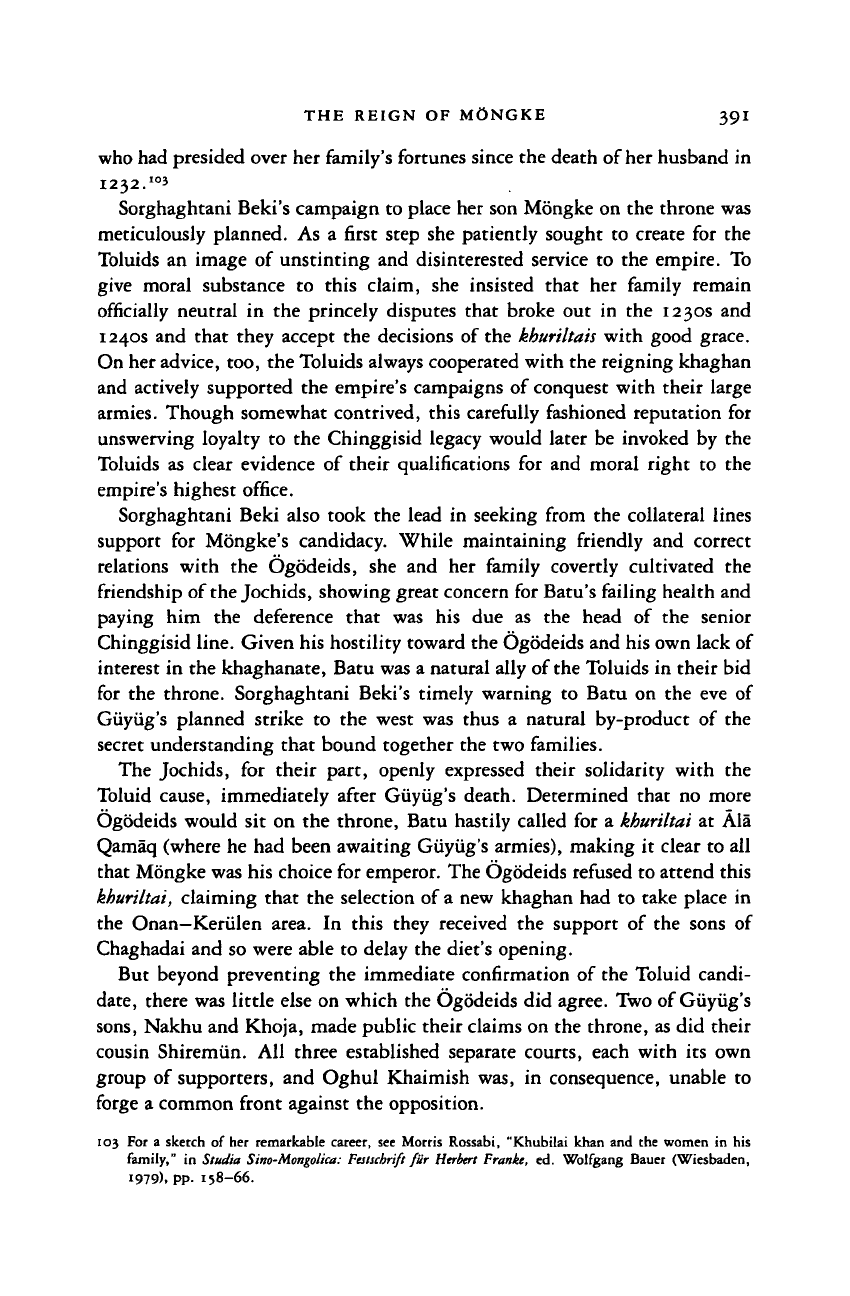
THE REIGN OF M5NGKE 391
who had presided over her family's fortunes since the death of her husband in
1232.
10
3
Sorghaghtani Beki's campaign to place her son Mongke on the throne was
meticulously planned. As
a
first step she patiently sought to create
for
the
Toluids an image of unstinting and disinterested service
to
the empire.
To
give moral substance
to
this claim,
she
insisted that
her
family remain
officially neutral
in
the princely disputes that broke out
in
the 1230s and
1240s and that they accept the decisions of the
khuriltais
with good grace.
On her
advice,
too, the Toluids always cooperated with the reigning khaghan
and actively supported the empire's campaigns of conquest with their large
armies. Though somewhat contrived, this carefully fashioned reputation for
unswerving loyalty
to
the Chinggisid legacy would later be invoked by the
Toluids
as
clear evidence
of
their qualifications
for
and moral right
to
the
empire's highest office.
Sorghaghtani Beki also took the lead
in
seeking from the collateral lines
support
for
Mongke's candidacy. While maintaining friendly and correct
relations with
the
Ogodeids, she and
her
family covertly cultivated
the
friendship of the
Jochids,
showing great concern for Batu's failing health and
paying
him the
deference that
was his due as the
head
of the
senior
Chinggisid line. Given his hostility toward the Ogodeids and his own lack of
interest in the khaghanate, Batu was a natural ally of the Toluids in their bid
for the throne. Sorghaghtani Beki's timely warning
to
Batu on the eve of
Giiyiig's planned strike
to
the west was thus
a
natural by-product
of
the
secret understanding that bound together the two families.
The Jochids,
for
their part, openly expressed their solidarity with
the
Toluid cause, immediately after Giiyiig's death. Determined that no more
Ogodeids would sit on the throne, Batu hastily called for a
khuriltai
at
Ala
Qamaq (where he had been awaiting Giiyiig's armies), making
it
clear to all
that Mongke was his choice for emperor. The Ogodeids refused to attend this
khuriltai, claiming that the selection of a new khaghan had to take place
in
the Onan-Keriilen area.
In
this they received the support
of
the sons
of
Chaghadai and so were able to delay the diet's opening.
But beyond preventing the immediate confirmation of the Toluid candi-
date,
there was little else on which the Ogodeids did agree. Two of Giiyiig's
sons,
Nakhu and Khoja, made public their claims on the throne, as did their
cousin Shiremiin. All three established separate courts, each with
its
own
group of supporters, and Oghul Khaimish was,
in
consequence, unable
to
forge a common front against the opposition.
103 For
a
sketch
of
her remarkable career, see Morris Rossabi, "Khubilai khan and the women
in
his
family,"
in
Studia Sino-Mongolica: Festschrift
fur
Herbert Franke,
ed.
Wolfgang Bauer (Wiesbaden,
'979).
PP- 158-66.
Cambridge Histories Online © Cambridge University Press, 2008
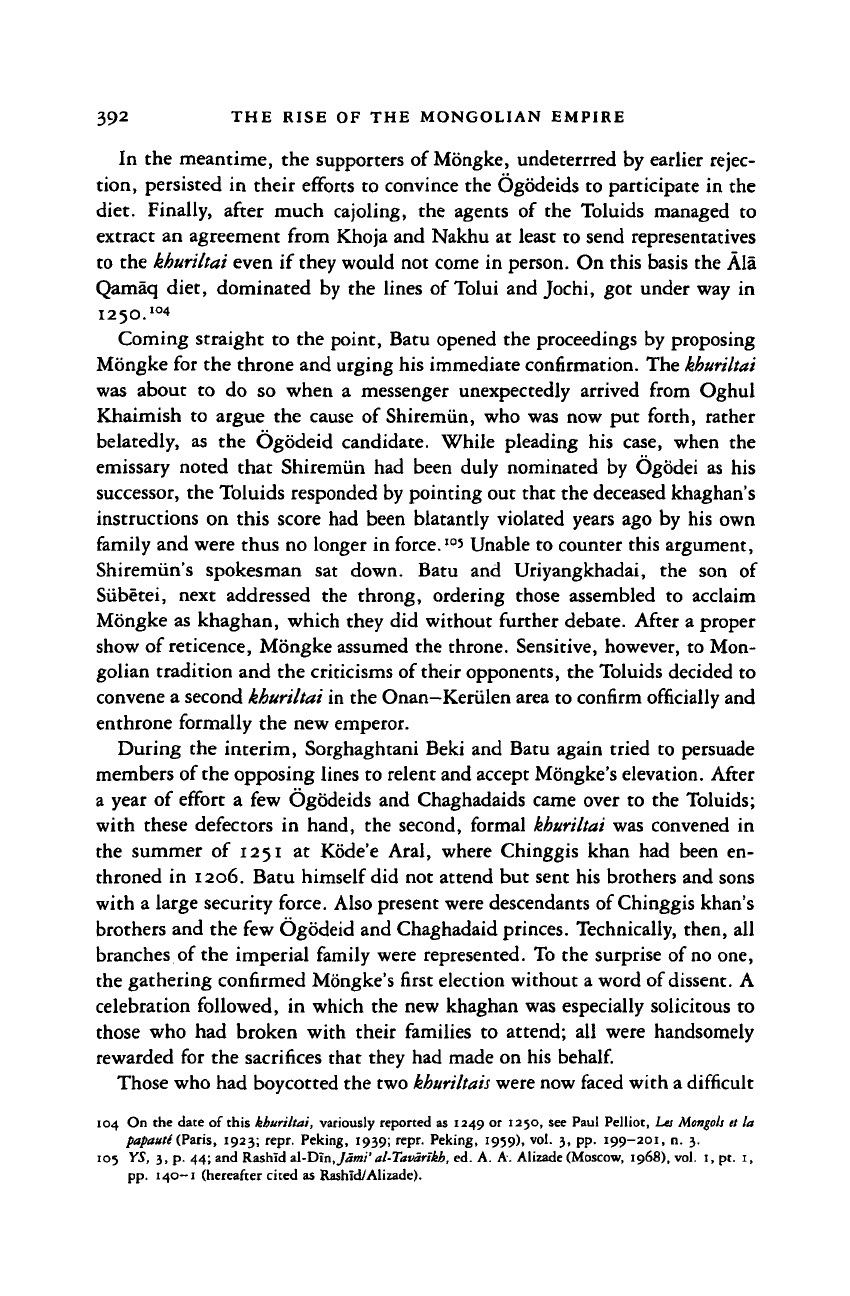
39
2
THE RISE OF THE MONGOLIAN EMPIRE
In the meantime, the supporters of Mongke, undeterrred by earlier rejec-
tion, persisted in their efforts to convince the Ogodeids to participate in the
diet. Finally, after much cajoling, the agents of the Toluids managed to
extract an agreement from Khoja and Nakhu at least to send representatives
to the khuriltai even if they would not come in person. On this basis the Ala
Qamaq diet, dominated by the lines of Tolui and Jochi, got under way in
1250.
1O4
Coming straight to the point, Batu opened the proceedings by proposing
Mongke for the throne and urging his immediate confirmation. The
khuriltai
was about to do so when a messenger unexpectedly arrived from Oghul
Khaimish to argue the cause of Shiremiin, who was now put forth, rather
belatedly, as the Ogodeid candidate. While pleading his case, when the
emissary noted that Shiremiin had been duly nominated by Ogodei as his
successor, the Toluids responded by pointing out that the deceased khaghan's
instructions on this score had been blatantly violated years ago by his own
family and were thus no longer in force.
105
Unable to counter this argument,
Shiremiin's spokesman sat down. Batu and Uriyangkhadai, the son of
Siibetei, next addressed the throng, ordering those assembled to acclaim
Mongke as khaghan, which they did without further debate. After a proper
show of reticence, Mongke assumed the throne. Sensitive, however, to Mon-
golian tradition and the criticisms of their opponents, the Toluids decided to
convene a second khuriltai in the Onan-Keriilen area to confirm officially and
enthrone formally the new emperor.
During the interim, Sorghaghtani Beki and Batu again tried to persuade
members of the opposing lines to relent and accept Mongke's elevation. After
a year of effort a few Ogodeids and Chaghadaids came over to the Toluids;
with these defectors in hand, the second, formal khuriltai was convened in
the summer of 1251 at Kode'e Aral, where Chinggis khan had been en-
throned in 1206. Batu himself did not attend but sent his brothers and sons
with a large security force. Also present were descendants of Chinggis khan's
brothers and the few Ogodeid and Chaghadaid princes. Technically, then, all
branches of the imperial family were represented. To the surprise of
no
one,
the gathering confirmed Mongke's first election without a word of dissent. A
celebration followed, in which the new khaghan was especially solicitous to
those who had broken with their families to attend; all were handsomely
rewarded for the sacrifices that they had made on his
behalf.
Those who had boycotted the two
khuriltais
were now faced with a difficult
104 On the date of this khuriltai, variously reported as 1249 or 1230, see Paul Pelliot, Les
Mongols
et la
papauti(Paris, 1923; repr. Peking, 1939; repr. Peking, 1959), vol. 3, pp. 199—201, n. 3.
10;
YS, 3, p. 44; and Rashid al-Din,Jami'al-Tapariib, ed. A. A. Alizade (Moscow, 1968), vol. i,pt. 1,
pp.
140—1 (hereafter cited as Rashld/Alizade).
Cambridge Histories Online © Cambridge University Press, 2008
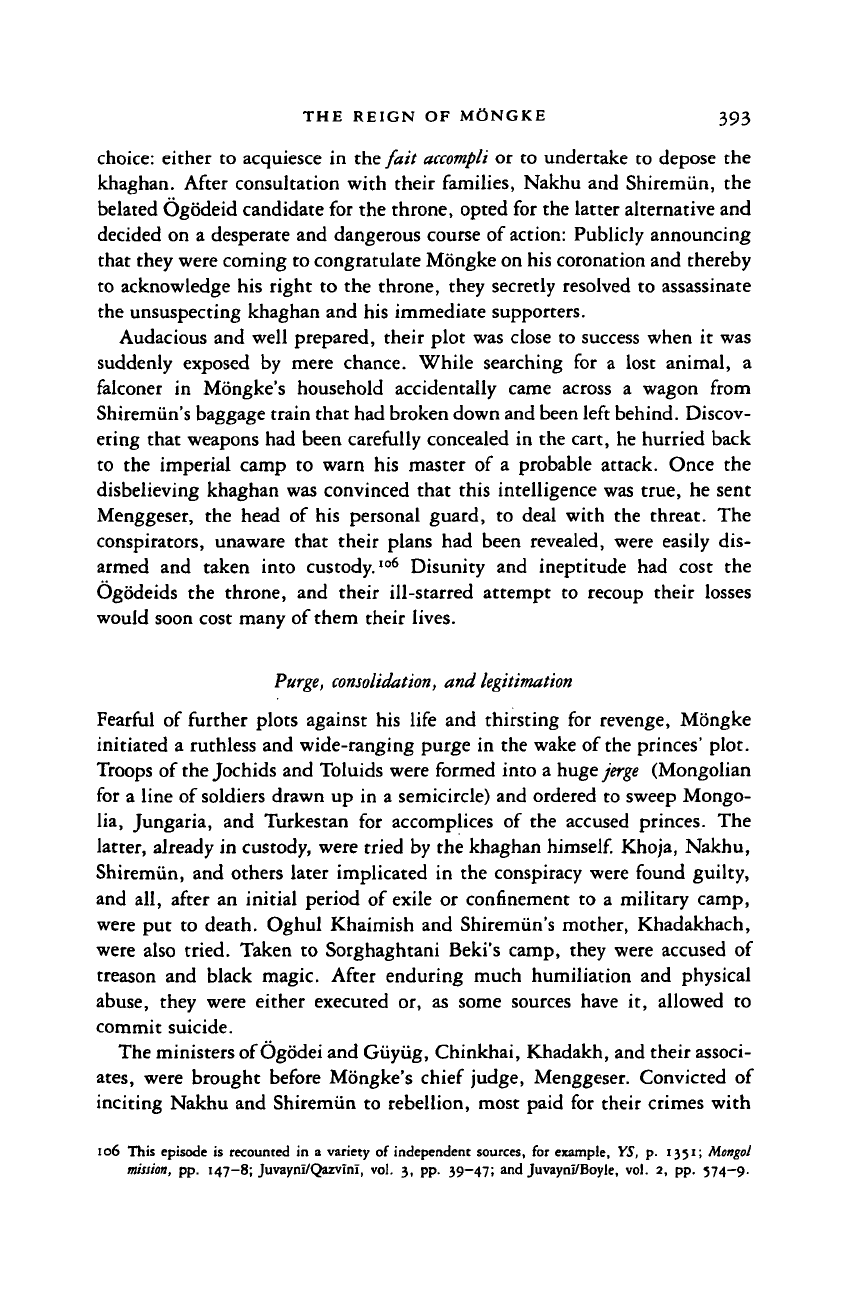
THE REIGN OF MONGKE 393
choice: either to acquiesce in the fait
accompli
or to undertake to depose the
khaghan. After consultation with their families, Nakhu and Shiremiin, the
belated Ogodeid candidate for the throne, opted for the latter alternative and
decided on a desperate and dangerous course of action: Publicly announcing
that they were coming to congratulate Mongke on his coronation and thereby
to acknowledge his right to the throne, they secretly resolved to assassinate
the unsuspecting khaghan and his immediate supporters.
Audacious and well prepared, their plot was close to success when it was
suddenly exposed by mere chance. While searching for a lost animal, a
falconer in Mongke's household accidentally came across a wagon from
Shiremiin's baggage train that had broken down and been left behind. Discov-
ering that weapons had been carefully concealed in the cart, he hurried back
to the imperial camp to warn his master of a probable attack. Once the
disbelieving khaghan was convinced that this intelligence was true, he sent
Menggeser, the head of his personal guard, to deal with the threat. The
conspirators, unaware that their plans had been revealed, were easily dis-
armed and taken into custody.
106
Disunity and ineptitude had cost the
Ogodeids the throne, and their ill-starred attempt to recoup their losses
would soon cost many of them their lives.
Purge, consolidation, and legitimation
Fearful of further plots against his life and thirsting for revenge, Mongke
initiated a ruthless and wide-ranging purge in the wake of the princes' plot.
Troops of the Jochids and Toluids were formed into a huge
jerge
(Mongolian
for a line of soldiers drawn up in a semicircle) and ordered to sweep Mongo-
lia, Jungaria, and Turkestan for accomplices of the accused princes. The
latter, already in custody, were tried by the khaghan
himself.
Khoja, Nakhu,
Shiremiin, and others later implicated in the conspiracy were found guilty,
and all, after an initial period of exile or confinement to a military camp,
were put to death. Oghul Khaimish and Shiremiin's mother, Khadakhach,
were also tried. Taken to Sorghaghtani Beki's camp, they were accused of
treason and black magic. After enduring much humiliation and physical
abuse, they were either executed or, as some sources have it, allowed to
commit suicide.
The ministers of Ogodei and Giiyiig, Chinkhai, Khadakh, and their associ-
ates,
were brought before Mongke's chief judge, Menggeser. Convicted of
inciting Nakhu and Shiremiin to rebellion, most paid for their crimes with
106 This episode is recounted in a variety of independent sources, for example, YS, p. 1351; Mongol
mission, pp. 147—8; Juvayni/Qarvini, vol. 3, pp. 39—47; and Juvaynl/Boyle, vol. 2, pp. 574—9.
Cambridge Histories Online © Cambridge University Press, 2008
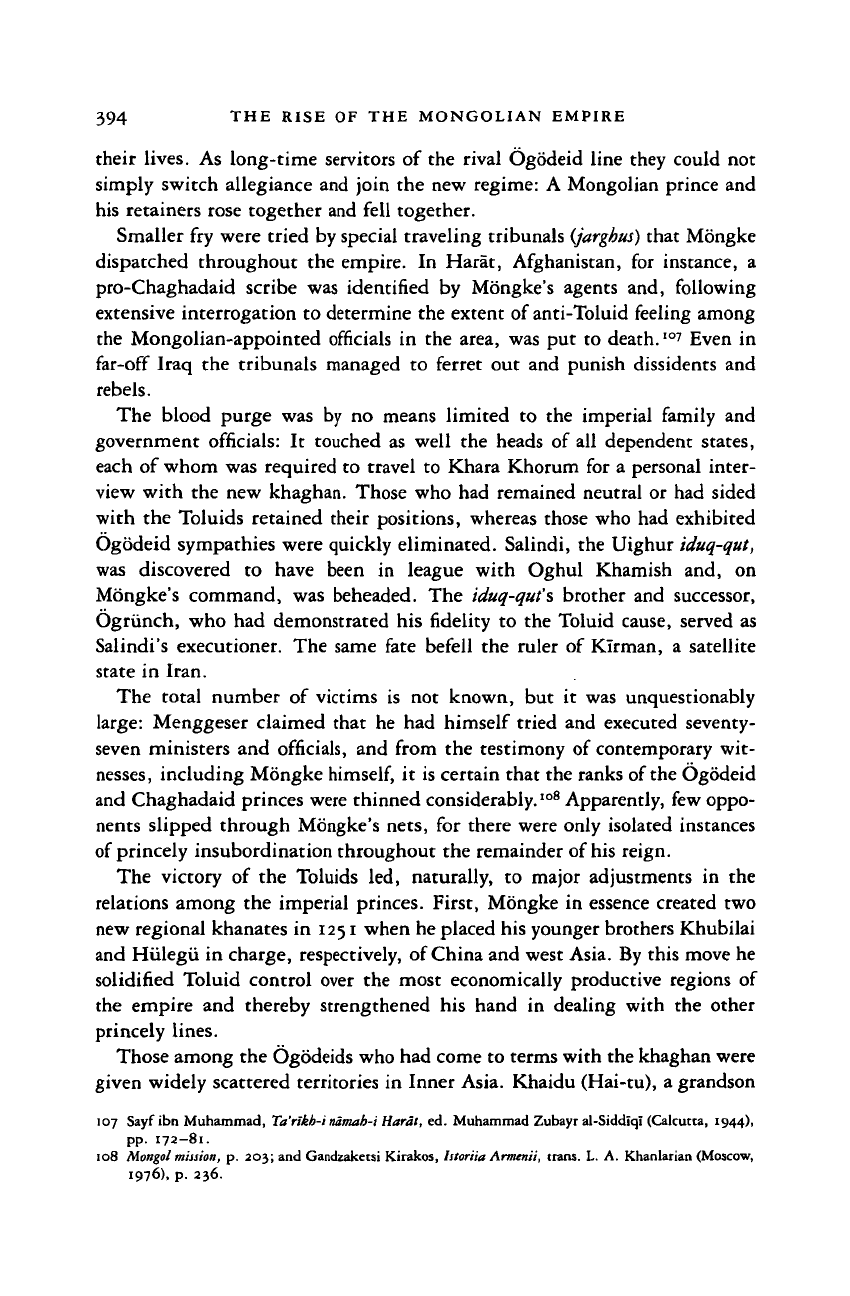
394
THE
R'SE OF THE MONGOLIAN EMPIRE
their lives. As long-time servitors of the rival Ogodeid line they could not
simply switch allegiance and join the new regime: A Mongolian prince and
his retainers rose together and fell together.
Smaller fry were tried by special traveling tribunals
(jargbus)
that Mongke
dispatched throughout the empire. In Harat, Afghanistan, for instance, a
pro-Chaghadaid scribe was identified by Mongke's agents and, following
extensive interrogation to determine the extent of anti-Toluid feeling among
the Mongolian-appointed officials in the area, was put to death.
'°
7
Even in
far-off Iraq the tribunals managed to ferret out and punish dissidents and
rebels.
The blood purge was by no means limited to the imperial family and
government officials: It touched as well the heads of all dependent states,
each of whom was required to travel to Khara Khorum for a personal inter-
view with the new khaghan. Those who had remained neutral or had sided
with the Toluids retained their positions, whereas those who had exhibited
Ogodeid sympathies were quickly eliminated. Salindi, the Uighur iduq-qut,
was discovered to have been in league with Oghul Khamish and, on
Mongke's command, was beheaded. The iduq-qut's brother and successor,
Ogriinch, who had demonstrated his fidelity to the Toluid cause, served as
Salindi's executioner. The same fate befell the ruler of Klrman, a satellite
state in Iran.
The total number of victims is not known, but it was unquestionably
large: Menggeser claimed that he had himself tried and executed seventy-
seven ministers and officials, and from the testimony of contemporary wit-
nesses, including Mongke
himself,
it is certain that the ranks of
the
Ogodeid
and Chaghadaid princes were thinned considerably.
Io8
Apparently, few oppo-
nents slipped through Mongke's nets, for there were only isolated instances
of princely insubordination throughout the remainder of his reign.
The victory of the Toluids led, naturally, to major adjustments in the
relations among the imperial princes. First, Mongke in essence created two
new regional khanates in 1251 when he placed his younger brothers Khubilai
and Hiilegii in charge, respectively, of China and west Asia. By this move he
solidified Toluid control over the most economically productive regions of
the empire and thereby strengthened his hand in dealing with the other
princely lines.
Those among the Ogodeids who had come to terms with the khaghan were
given widely scattered territories in Inner Asia. Khaidu (Hai-tu), a grandson
107
Sayf
ibn
Muhammad,
Ta'rikh-i nimah-i
Harat,
ed.
Muhammad Zubayr al-Siddiql
(Calcutta,
1944),
pp. 172-81.
108
Mongol
mission,
p. 203; and
Gandzaketsi
Kirakos,
Istoriia
Armenii,
trans. L. A.
Khanlarian
(Moscow,
1976), p. 236.
Cambridge Histories Online © Cambridge University Press, 2008
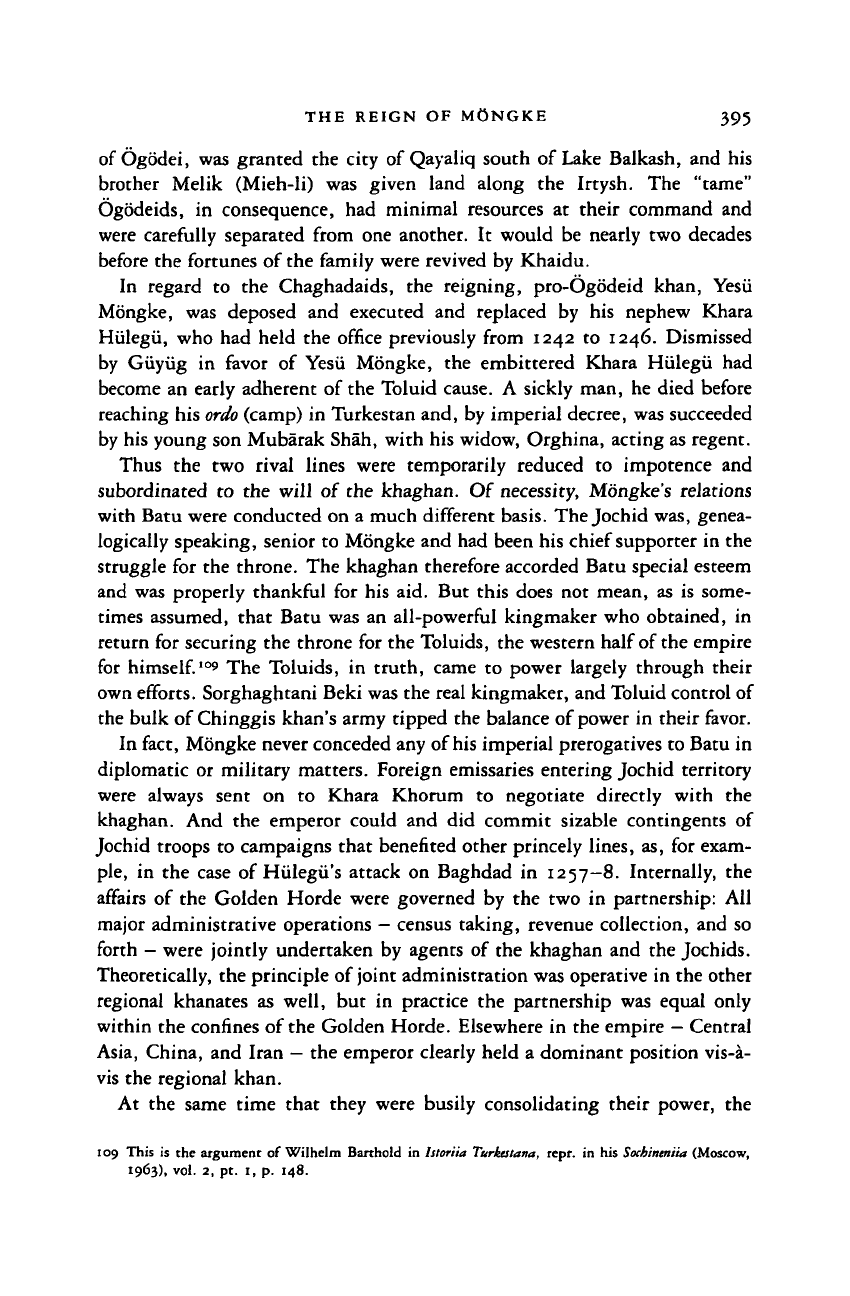
THE REIGN OF MijNGKE 395
of Ogodei, was granted the city of Qayaliq south of Lake Balkash, and his
brother Melik (Mieh-li) was given land along the Irtysh. The "tame"
Ogodeids, in consequence, had minimal resources at their command and
were carefully separated from one another. It would be nearly two decades
before the fortunes of the family were revived by Khaidu.
In regard to the Chaghadaids, the reigning, pro-Ogodeid khan, Yesii
Mongke, was deposed and executed and replaced by his nephew Khara
Hiilegii, who had held the office previously from 1242 to 1246. Dismissed
by Giiyvig in favor of Yesii Mongke, the embittered Khara Hiilegii had
become an early adherent of the Toluid cause. A sickly man, he died before
reaching his
ordo
(camp) in Turkestan and, by imperial decree, was succeeded
by his young son Mubarak Shah, with his widow, Orghina, acting as regent.
Thus the two rival lines were temporarily reduced to impotence and
subordinated to the will of the khaghan. Of necessity, Mongke's relations
with Batu were conducted on a much different basis. The Jochid was, genea-
logically speaking, senior to Mongke and had been his chief supporter in the
struggle for the throne. The khaghan therefore accorded Batu special esteem
and was properly thankful for his aid. But this does not mean, as is some-
times assumed, that Batu was an all-powerful kingmaker who obtained, in
return for securing the throne for the Toluids, the western half of the empire
for
himself.
109
The Toluids, in truth, came to power largely through their
own efforts. Sorghaghtani Beki was the real kingmaker, and Toluid control of
the bulk of Chinggis khan's army tipped the balance of power in their favor.
In fact, Mongke never conceded any of his imperial prerogatives to Batu in
diplomatic or military matters. Foreign emissaries entering Jochid territory
were always sent on to Khara Khorum to negotiate directly with the
khaghan. And the emperor could and did commit sizable contingents of
Jochid troops to campaigns that benefited other princely lines, as, for exam-
ple,
in the case of Hiilegii's attack on Baghdad in 1257—8. Internally, the
affairs of the Golden Horde were governed by the two in partnership: All
major administrative operations - census taking, revenue collection, and so
forth
—
were jointly undertaken by agents of the khaghan and the Jochids.
Theoretically, the principle of joint administration was operative in the other
regional khanates as well, but in practice the partnership was equal only
within the confines of the Golden Horde. Elsewhere in the empire
—
Central
Asia, China, and Iran - the emperor clearly held a dominant position vis-a-
vis the regional khan.
At the same time that they were busily consolidating their power, the
109 This is the argument of Wilhelm Barthold in litoriia Turktstana, repr. in his Sochinmiia (Moscow,
1963),
vol. 2, pt. 1, p. 148.
Cambridge Histories Online © Cambridge University Press, 2008
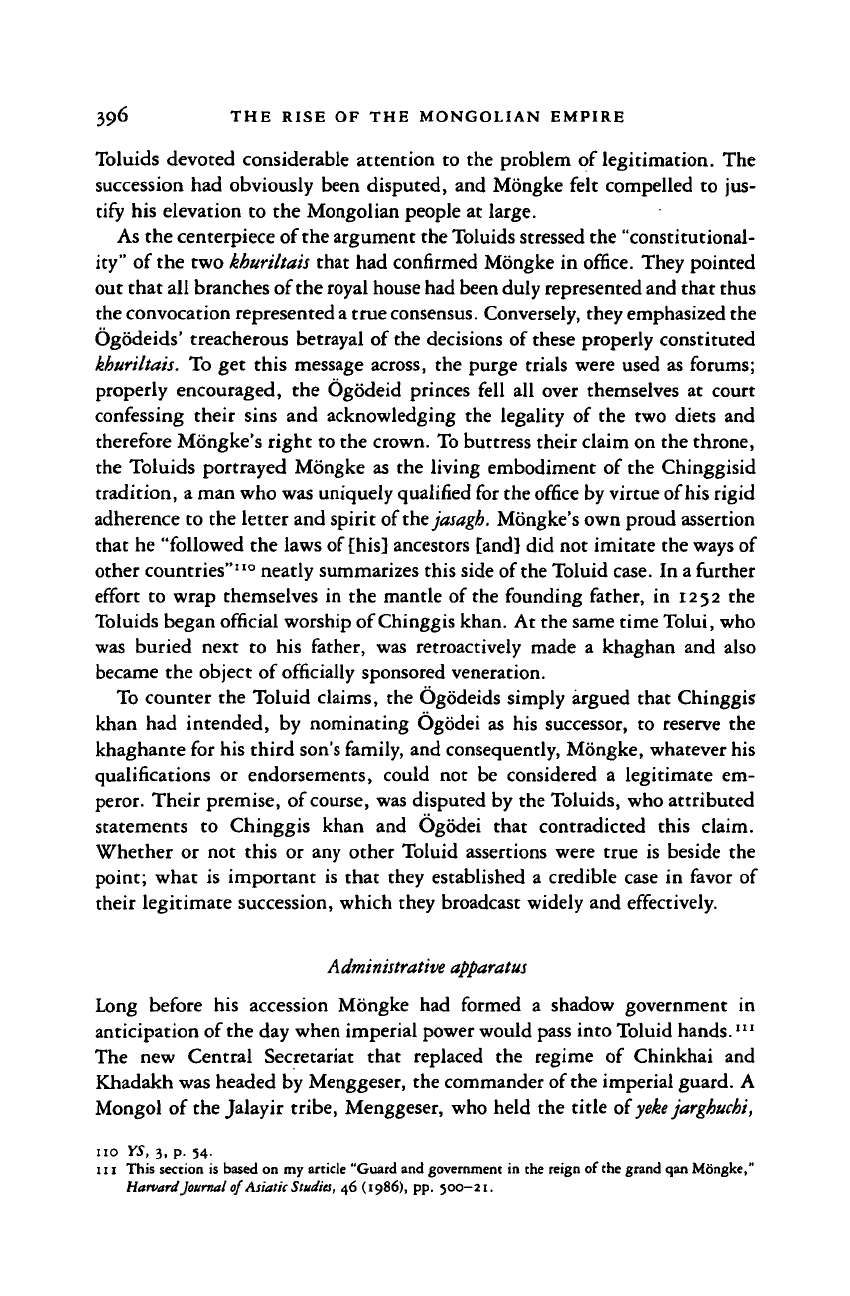
396 THE RISE OF THE MONGOLIAN EMPIRE
Toluids devoted considerable attention to the problem of legitimation. The
succession had obviously been disputed, and Mongke felt compelled to jus-
tify his elevation to the Mongolian people at large.
As the centerpiece of the argument the Toluids stressed the "constitutional-
ity" of the two
khuriltais
that had confirmed Mongke in office. They pointed
out that all branches of the royal house had been duly represented and that thus
the convocation represented
a
true
consensus.
Conversely, they emphasized the
Ogodeids' treacherous betrayal of the decisions of these properly constituted
khuriltais. To get this message across, the purge trials were used as forums;
properly encouraged, the Ogodeid princes fell all over themselves at court
confessing their sins and acknowledging the legality of the two diets and
therefore Mongke's right to the crown. To buttress their claim on the throne,
the Toluids portrayed Mongke as the living embodiment of the Chinggisid
tradition, a man who was uniquely qualified for the office by virtue of his rigid
adherence to the letter and spirit of the
jasagh.
Mongke's own proud assertion
that he "followed the laws of
[his]
ancestors
{and}
did not imitate the ways of
other countries"
110
neatly summarizes this side of
the
Toluid case. In a further
effort to wrap themselves in the mantle of the founding father, in 1252 the
Toluids began official worship of Chinggis khan. At the same time Tolui, who
was buried next to his father, was retroactively made a khaghan and also
became the object of officially sponsored veneration.
To counter the Toluid claims, the Ogodeids simply argued that Chinggis
khan had intended, by nominating Ogb'dei as his successor, to reserve the
khaghante for his third son's family, and consequently, Mongke, whatever his
qualifications or endorsements, could not be considered a legitimate em-
peror. Their premise, of course, was disputed by the Toluids, who attributed
statements to Chinggis khan and Ogodei that contradicted this claim.
Whether or not this or any other Toluid assertions were true is beside the
point; what is important is that they established a credible case in favor of
their legitimate succession, which they broadcast widely and effectively.
Administrative
apparatus
Long before his accession Mongke had formed a shadow government in
anticipation of
the
day when imperial power would pass into Toluid hands."
1
The new Central Secretariat that replaced the regime of Chinkhai and
Khadakh was headed by Menggeser, the commander of the imperial guard. A
Mongol of the Jalayir tribe, Menggeser, who held the title oiyeke jarghuchi,
no YS, 3, p. 54.
in This section is based on my article "Guard and government in the reign of the grand qan Mongke,"
Harvard
Journal
of
Asiatic
Studio, 46 (1986), pp.
500-21.
Cambridge Histories Online © Cambridge University Press, 2008
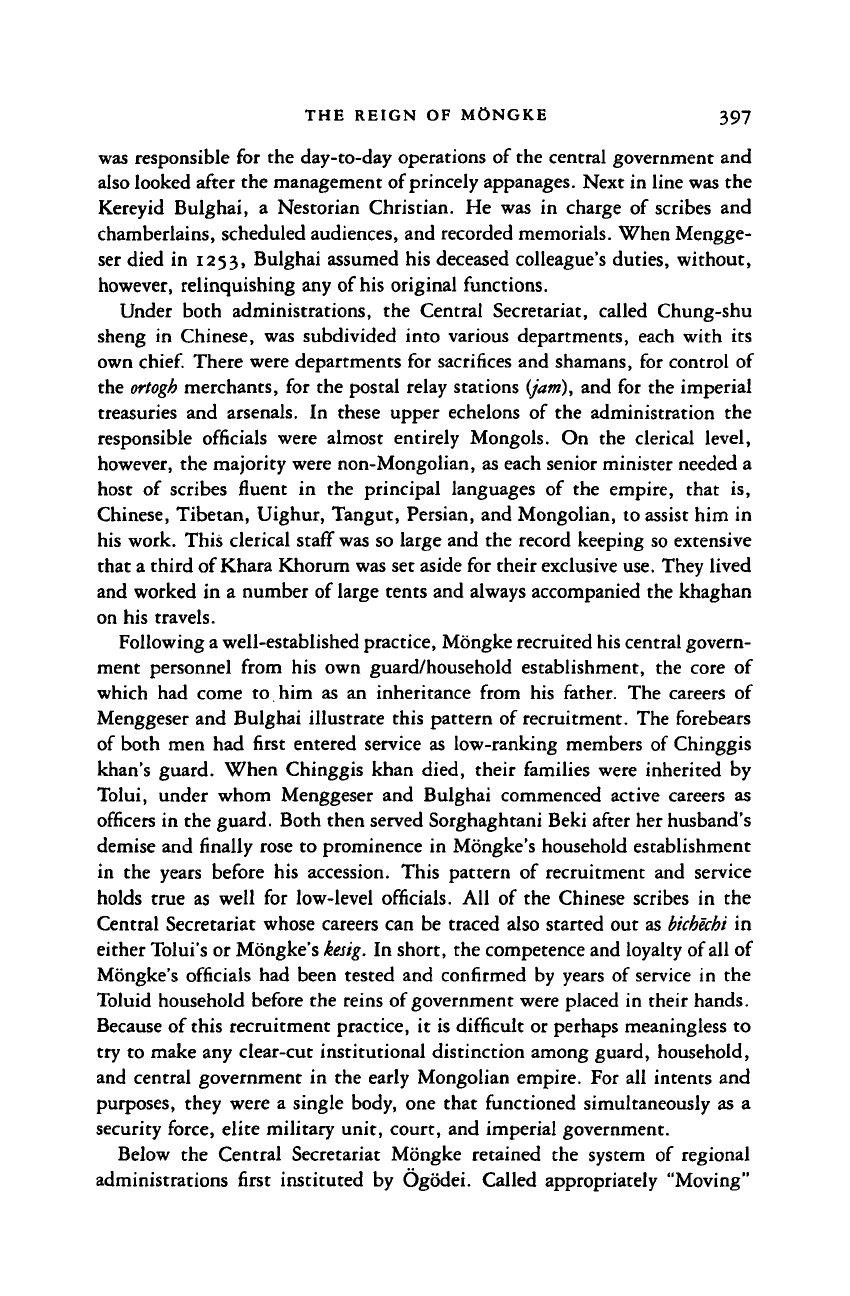
THE REIGN OF MONGKE 397
was responsible for the day-to-day operations of the central government and
also looked after the management of princely appanages. Next in line was the
Kereyid Bulghai, a Nestorian Christian. He was in charge of scribes and
chamberlains, scheduled audiences, and recorded memorials. When Mengge-
ser died in 1253, Bulghai assumed his deceased colleague's duties, without,
however, relinquishing any of his original functions.
Under both administrations, the Central Secretariat, called Chung-shu
sheng in Chinese, was subdivided into various departments, each with its
own
chief.
There were departments for sacrifices and shamans, for control of
the
ortogh
merchants, for the postal relay stations (jam), and for the imperial
treasuries and arsenals. In these upper echelons of the administration the
responsible officials were almost entirely Mongols. On the clerical level,
however, the majority were non-Mongolian, as each senior minister needed a
host of scribes fluent in the principal languages of the empire, that is,
Chinese, Tibetan, Uighur, Tangut, Persian, and Mongolian, to assist him in
his work. This clerical staff was so large and the record keeping so extensive
that a third of Khara Khorum was set aside for their exclusive use. They lived
and worked in a number of large tents and always accompanied the khaghan
on his travels.
Following a well-established practice, Mongke recruited his central govern-
ment personnel from his own guard/household establishment, the core of
which had come to him as an inheritance from his father. The careers of
Menggeser and Bulghai illustrate this pattern of recruitment. The forebears
of both men had first entered service as low-ranking members of Chinggis
khan's guard. When Chinggis khan died, their families were inherited by
Tolui, under whom Menggeser and Bulghai commenced active careers as
officers in the guard. Both then served Sorghaghtani Beki after her husband's
demise and finally rose to prominence in Mongke's household establishment
in the years before his accession. This pattern of recruitment and service
holds true as well for low-level officials. All of the Chinese scribes in the
Central Secretariat whose careers can be traced also started out as
bichechi
in
either Tolui's or Mongke's
kesig.
In short, the competence and loyalty of
all
of
Mongke's officials had been tested and confirmed by years of service in the
Toluid household before the reins of government were placed in their hands.
Because of this recruitment practice, it is difficult or perhaps meaningless to
try to make any clear-cut institutional distinction among guard, household,
and central government in the early Mongolian empire. For all intents and
purposes, they were a single body, one that functioned simultaneously as a
security force, elite military unit, court, and imperial government.
Below the Central Secretariat Mongke retained the system of regional
administrations first instituted by Ogodei. Called appropriately "Moving"
Cambridge Histories Online © Cambridge University Press, 2008
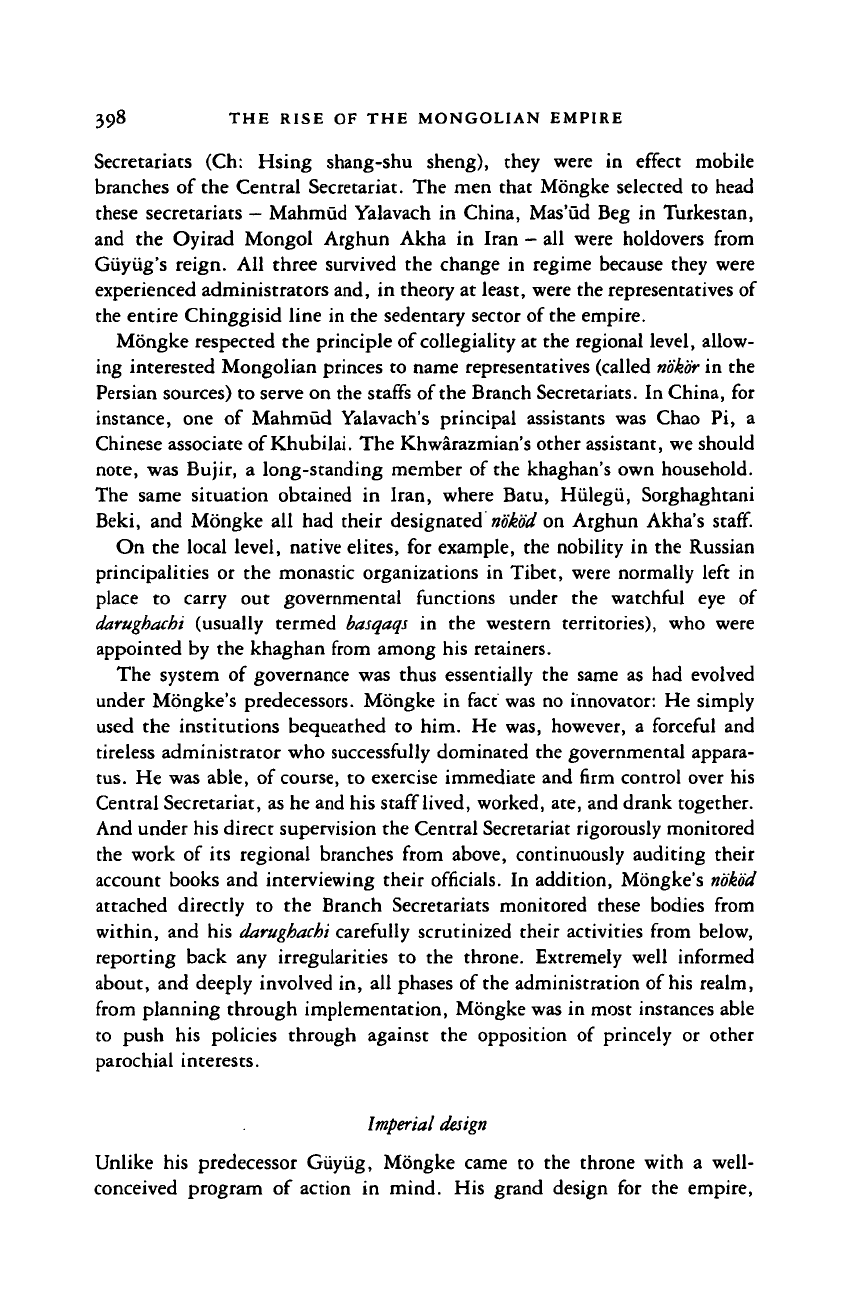
398 THE RISE OF THE MONGOLIAN EMPIRE
Secretariats (Ch: Hsing shang-shu sheng), they were in effect mobile
branches of the Central Secretariat. The men that Mongke selected to head
these secretariats
—
Mahmud Yalavach in China, Mas'iid Beg in Turkestan,
and the Oyirad Mongol Arghun Akha in Iran - all were holdovers from
Giiyiig's reign. All three survived the change in regime because they were
experienced administrators and, in theory at least, were the representatives of
the entire Chinggisid line in the sedentary sector of the empire.
Mongke respected the principle of collegiality at the regional level, allow-
ing interested Mongolian princes to name representatives (called
nok'dr
in the
Persian sources) to serve on the staffs of
the
Branch Secretariats. In China, for
instance, one of Mahmud Yalavach's principal assistants was Chao Pi, a
Chinese associate of
Khubilai.
The Khwarazmian's other assistant, we should
note,
was Bujir, a long-standing member of the khaghan's own household.
The same situation obtained in Iran, where Batu, Hiilegii, Sorghaghtani
Beki, and Mongke all had their designated
n'okb'd
on Arghun Akha's
staff.
On the local level, native elites, for example, the nobility in the Russian
principalities or the monastic organizations in Tibet, were normally left in
place to carry out governmental functions under the watchful eye of
darughachi
(usually termed
basqaqs
in the western territories), who were
appointed by the khaghan from among his retainers.
The system of governance was thus essentially the same as had evolved
under Mongke's predecessors. Mongke in fact was no innovator: He simply
used the institutions bequeathed to him. He was, however, a forceful and
tireless administrator who successfully dominated the governmental appara-
tus.
He was able, of course, to exercise immediate and firm control over his
Central Secretariat, as he and his staff lived, worked, ate, and drank together.
And under his direct supervision the Central Secretariat rigorously monitored
the work of its regional branches from above, continuously auditing their
account books and interviewing their officials. In addition, Mongke's riokod
attached directly to the Branch Secretariats monitored these bodies from
within, and his
darughachi
carefully scrutinized their activities from below,
reporting back any irregularities to the throne. Extremely well informed
about, and deeply involved in, all phases of the administration of his realm,
from planning through implementation, Mongke was in most instances able
to push his policies through against the opposition of princely or other
parochial interests.
Imperial design
Unlike his predecessor Giiyiig, Mongke came to the throne with a well-
conceived program of action in mind. His grand design for the empire,
Cambridge Histories Online © Cambridge University Press, 2008
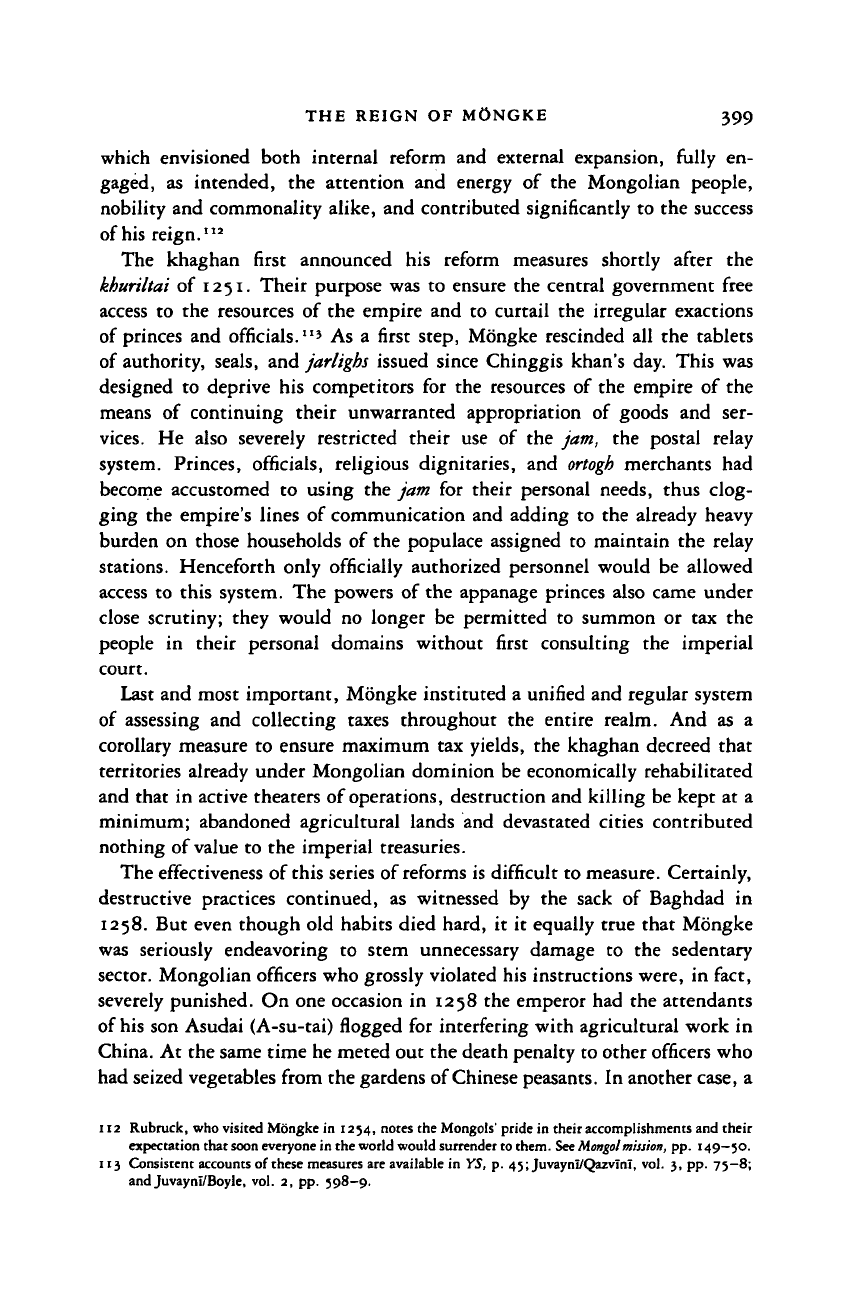
THE REIGN OF MONGKE 399
which envisioned both internal reform and external expansion, fully en-
gaged, as intended, the attention and energy of the Mongolian people,
nobility and commonality alike, and contributed significantly to the success
of his reign.
112
The khaghan first announced his reform measures shortly after the
khuriltai of 1251. Their purpose was to ensure the central government free
access to the resources of the empire and to curtail the irregular exactions
of princes and officials.
113
As a first step, Mbngke rescinded all the tablets
of authority, seals, and jarlighs issued since Chinggis khan's day. This was
designed to deprive his competitors for the resources of the empire of the
means of continuing their unwarranted appropriation of goods and ser-
vices.
He also severely restricted their use of the jam, the postal relay
system. Princes, officials, religious dignitaries, and ortogh merchants had
become accustomed to using the jam for their personal needs, thus clog-
ging the empire's lines of communication and adding to the already heavy
burden on those households of the populace assigned to maintain the relay
stations. Henceforth only officially authorized personnel would be allowed
access to this system. The powers of the appanage princes also came under
close scrutiny; they would no longer be permitted to summon or tax the
people in their personal domains without first consulting the imperial
court.
Last and most important, Mongke instituted a unified and regular system
of assessing and collecting taxes throughout the entire realm. And as a
corollary measure to ensure maximum tax yields, the khaghan decreed that
territories already under Mongolian dominion be economically rehabilitated
and that in active theaters of operations, destruction and killing be kept at a
minimum; abandoned agricultural lands and devastated cities contributed
nothing of value to the imperial treasuries.
The effectiveness of this series of reforms is difficult to measure. Certainly,
destructive practices continued, as witnessed by the sack of Baghdad in
1258.
But even though old habits died hard, it it equally true that Mongke
was seriously endeavoring to stem unnecessary damage to the sedentary
sector. Mongolian officers who grossly violated his instructions were, in fact,
severely punished. On one occasion in 1258 the emperor had the attendants
of his son Asudai (A-su-tai) flogged for interfering with agricultural work in
China. At the same time he meted out the death penalty to other officers who
had seized vegetables from the gardens of Chinese peasants. In another case, a
112 Rubruck, who visited Mongke in 1254, notes the Mongols' pride in their accomplishments and their
expectation that soon everyone in the world would surrender to them. See
Mongol
mission,
pp. 149—30.
113 Consistent accounts of these measures are available in YS, p.
45;
Juvaynl/Qazvlnl, vol. 3, pp. 75—8;
and Juvaynl/Boyle, vol. 2, pp. 598—9.
Cambridge Histories Online © Cambridge University Press, 2008
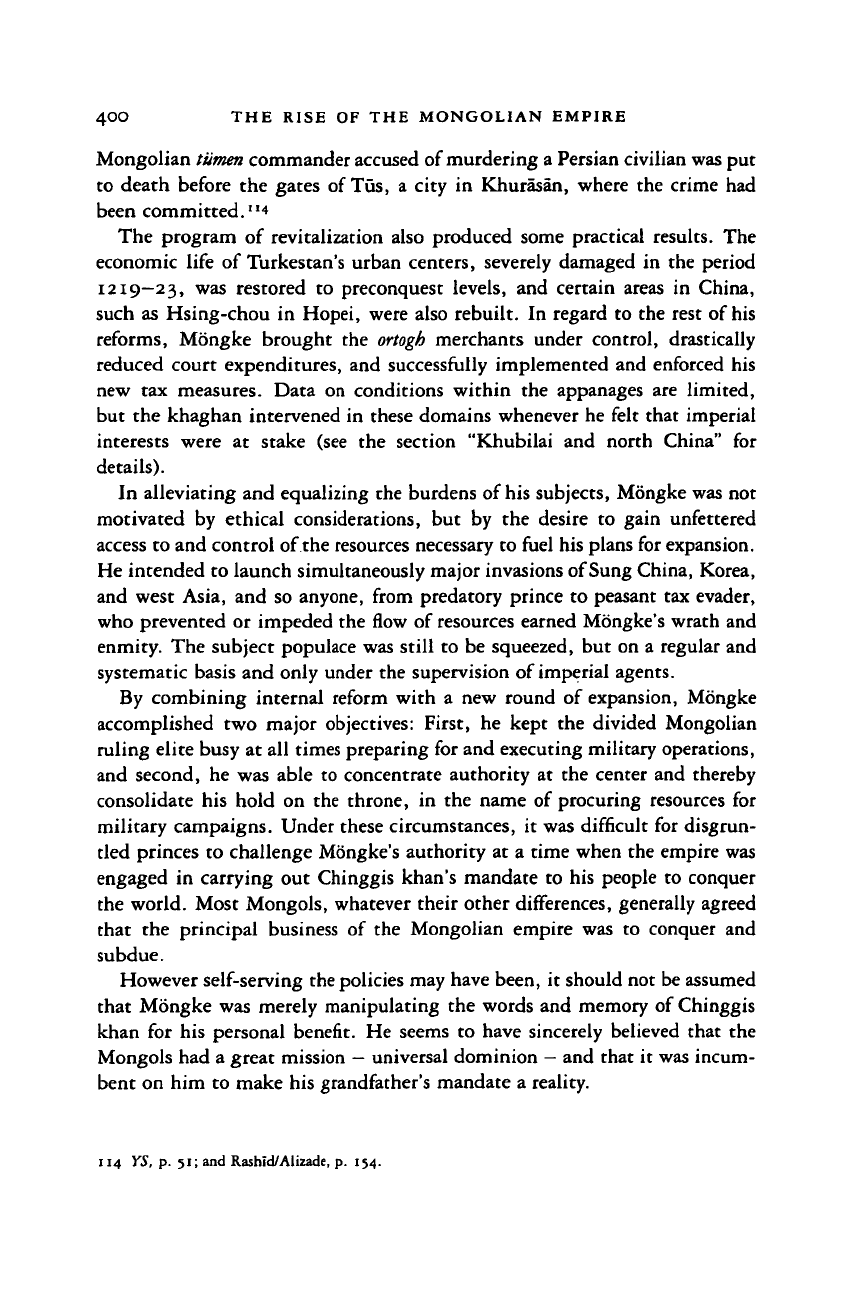
4OO THE RISE OF THE MONGOLIAN EMPIRE
Mongolian
tiimen
commander accused of murdering a Persian civilian was put
to death before
the
gates
of
Tus,
a
city
in
Khurasan, where
the
crime
had
been committed.
"•»
The program
of
revitalization also produced some practical results.
The
economic life
of
Turkestan's urban centers, severely damaged
in the
period
1219—23,
was
restored
to
preconquest levels,
and
certain areas
in
China,
such
as
Hsing-chou
in
Hopei, were also rebuilt.
In
regard
to the
rest
of
his
reforms, Mongke brought
the
ortogh
merchants under control, drastically
reduced court expenditures,
and
successfully implemented
and
enforced
his
new
tax
measures. Data
on
conditions within
the
appanages
are
limited,
but
the
khaghan intervened
in
these domains whenever he felt that imperial
interests were
at
stake
(see the
section "Khubilai
and
north China"
for
details).
In alleviating
and
equalizing
the
burdens
of
his
subjects, Mongke was
not
motivated
by
ethical considerations,
but by the
desire
to
gain unfettered
access
to
and control of
the
resources necessary
to
fuel his plans for expansion.
He intended to launch simultaneously major invasions of Sung China, Korea,
and west Asia,
and so
anyone, from predatory prince
to
peasant
tax
evader,
who prevented
or
impeded the flow
of
resources earned Mongke's wrath and
enmity.
The
subject populace was still
to be
squeezed,
but on a
regular and
systematic basis
and
only under
the
supervision
of
imperial agents.
By combining internal reform with
a new
round
of
expansion, Mongke
accomplished
two
major objectives: First,
he
kept
the
divided Mongolian
ruling elite busy
at
all times preparing
for
and executing military operations,
and second,
he was
able
to
concentrate authority
at the
center
and
thereby
consolidate
his
hold
on the
throne,
in the
name
of
procuring resources
for
military campaigns. Under these circumstances,
it
was difficult
for
disgrun-
tled princes
to
challenge Mongke's authority
at a
time when the empire was
engaged
in
carrying
out
Chinggis khan's mandate
to his
people
to
conquer
the world. Most Mongols, whatever their other differences, generally agreed
that
the
principal business
of the
Mongolian empire
was to
conquer
and
subdue.
However self-serving the policies may have been,
it
should not be assumed
that Mongke was merely manipulating
the
words
and
memory
of
Chinggis
khan
for his
personal benefit.
He
seems
to
have sincerely believed that
the
Mongols had
a
great mission
—
universal dominion
—
and
that
it
was incum-
bent
on him to
make his grandfather's mandate
a
reality.
114
YS, p.
51;
and
RashidMlizade,
p. 154.
Cambridge Histories Online © Cambridge University Press, 2008
